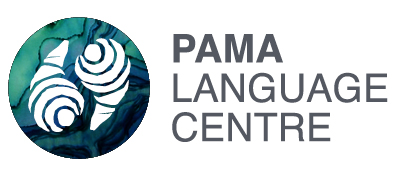Guugu Yimithirr Lesson 10
Four important verb forms
There are many forms of each verb (action word) in Guugu Yimithirr. Today we’ll look at four forms:
- Future
- Present Ongoing
- Past
- Imperative (Command)
Let’s begin with the verb balgal, “to make”. The forms are:
- Future: balgal – ending is –l
- Present Ongoing: balgaalgal – verb is made one syllable longer
- Past: balgay – ending is –y
- Imperative (Command): balgala – ending is –la
The form balgal is also the wordlist form. The linguists who have written the grammar books have chosen the future tense form as the reference form for wordlists and dictionaries.
The future tense form is called non-past tense in many books, such as John Haviland’s Guugu Yimidhirr grammar. But it usually signifies something that will happen in the future, so for the time being we call it future tense.
The word for “writing” or “book” is gaban. Gaban balgal means “will write”. Let’s make some sentences with the verb balgal:
Ngayu gaban balgal – “I’ll write”
Thana gaban balgaalgal – “They are writing”
Nhulu gaban balgay – “He wrote” (or “She wrote”)
Gaban balgala! – “Write!”
The verb budal, “to eat”, is simlar to balgal:
- Future: budal – ending is –l
- Present Ongoing: budaaral – verb is made one syllable longer
- Past: buday – ending is –y
- Imperative (Command): budala – ending is –la
We can make some sentences with words we’ve learned:
Ngayu mayi budal – “I shall eat the food”
Thana mayi budaaral – “They are eating the food”
Nhulu mayi buday – “He ate the food”
Mayi budala! – “Eat the food”
The endings of verbs are not always the same. The largest group of verbs has the same endings as balgal and budal. But some common verbs go like the verb thadaa, which means “to go”:
- Future: thadaa – ending is to make last vowel long
- Present Ongoing: thadaara – verb is made one syllable longer
- Past: thaday – ending is –y
- Imperative (Command): thadii – ending is –ii
A verb that has the same ending as thadaa is gadaa, which means “to come”. These two verb are easy to remember: they are opposites,they rhyme, and hare the same endings.
Gadaa, gadaara, gaday, gadii
SUMMARY OF LESSON 10
There are many more verb forms in Guugu Yimithirr than in English, but some are more important to learn.
WORDS IN LESSON 10
balgal – “will make”
balgaalgal – “is making”
balgay – “made”
balgala – “make!”
budal – “will eat”
budaaral – “is eating”
buday – “ate”
budala – “eat!”
thadaa – “will go”
thadaara – “is going”
thaday – “went”
thadii! – “go!”
gadaa – “will come”
gadaara – “is coming”
gaday – “came”
gadii! – “come!”
GRAMMAR FACTS IN LESSON 10
Verbs can be divided into groups depending on their endings. The groups are called “conjugations”. One group is the L Conjugation:
- Future: ending is –l
- Present Ongoing: verb is made one syllable longer
- Past: ending is –y
- Imperative (Command): ending is –la
The name of the L Conjugation comes from the L in balgaL.
Another group is the V Conjugation. V stands for vowel; verbs such as thadaa and gadaa end in long vowels. The endings are:
- Future: ending is to make last vowel long
- Present Ongoing: verb is made one syllable longer
- Past: ending is –y
- Imperative (Command): ending is –ii
Note that the Past tense ending is the same in both conjugations.
TEST YOURSELF
Now go to the Quizlet web site to practice what you learned in this lesson:
(End)
